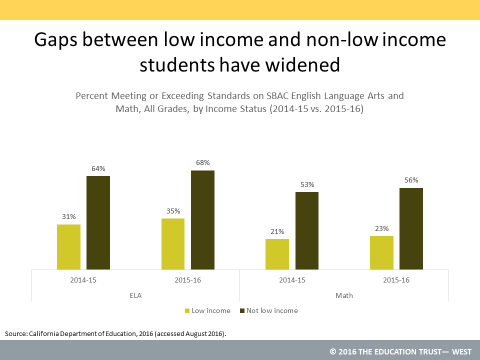The results on California’s Common Core-aligned Smarter Balanced assessments give us a look at how our schools and districts are doing as they prepare students for college and career. The good news in this year’s results is that we see some improvement across the board – overall math scores for the state are up an average of 4 percentage points across all grades and English scores are up an average of 5 percentage points across all grades. These improvements mean more students are on track for college and career readiness and should be celebrated. However, the vast number of schools and districts where the majority of students of color and low-income students aren’t meeting standards tell us we’ve got a lot of work to do.
The Education Trust–West Statement on the 2016 Results of the Smarter Balanced
Assessments Today, the California Department of Education released new state test results, giving us a look at how our schools and districts are doing as they prepare students for college and career. The good news is we see some improvement across the board – overall math scores for the state are up an average of 4 percentage points across all grades, and English scores are up an average of 5 percentage points across all grades. These improvements mean more students are on track for college and career readiness and should be celebrated. However, the vast number of schools and districts where the majority of students of color and low-income students aren’t meeting standards tell us we’ve got a lot of work to do. While some student subgroups are making notable progress – including Latino students whose scores are up 5 percentage points in English Language Arts – we see some evidence of a disturbing trend arising. While scores for all subgroups are up, some achievement gaps are widening. For instance, math scores for Black students only increased by 2 percentage points, while scores for other ethnic groups went up by 3-5 percentage points. English learners improved overall, but not at the same rate as the rest of California’s students and a sizable gap still remains between English learners and non-English learners. When we look at the millions of California students living in poverty, we see fewer than 1 in 4 low-income students are meeting standards in math. While the overall improvement in scores is positive, we need faster progress for all students, and swifter gap closure for our students of color, English learner, and low-income students. If not, it will be decades before some groups of California students are fully meeting standards and on track for college, careers, and life. In the coming weeks and months, we will provide more comprehensive analyses of this data, including highlighting bright spots so other schools and districts can learn from their practices and connect with fellow education leaders and educators. Fulfilling the promise of the new state standards requires creating a culture of high expectations for all students. While the state has put considerable effort into Common Core implementation, we have not provided adequate funding to meet the estimated cost of implementing the new standards effectively, let alone equitably. This means that some schools and districts are forced to make choices between fully funding evidence-based practices in state standards implementation and other competing priorities. California shifted to new state standards because 21st century careers and challenges demand that our students be able to think critically and solve complex problems. The students in our schools now will go on to be the doctors, scientists, teachers, artists, and community leaders that continue California’s legacy of innovation and excellence. We should do everything possible to make sure all educators are well-prepared and supported in teaching these new standards – after all, the future of our state hinges on the success of our students.
Visit The Education Trust-West site by clicking below:
Results of the 2015-16 Smarter Balanced Assessments in California
Education Trust West
Equity-Driven • Data-Centered • Student-Focused

